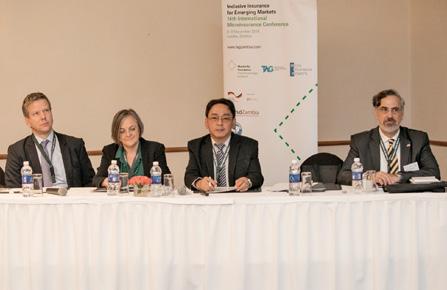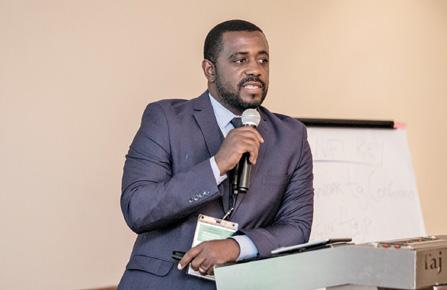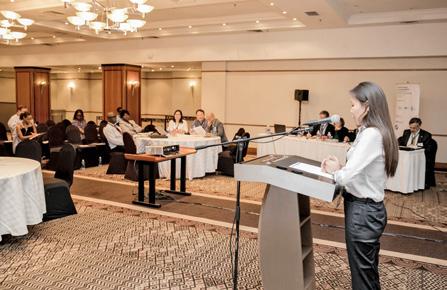
6 minute read
Pre-conference workshop Promoting cross-country knowledge exchange and regulatory dialogue
By Mandargua Tsegmid and Dante Oliver Portula
Advertisement
The session brought together African and Asian public and private insurance stakeholders, who shared insights into promoting inclusive insurance markets across countries through peer-to-peer platforms. The Mutual Exchange Forum on Inclusive Insurance Network (MEFIN) countries (Indonesia, Mongolia, Nepal, Pakistan, the Philippines, Sri Lanka and Vietnam) have a combined microinsurance client outreach of about 75 million people. The Philippines, Indonesia and Pakistan have the biggest outreach at 34 million, 22 million and 16.8 million respectively4 , as of June 2018. Financial institutions are the dominant distribution channels. MNOs and utility companies are additional channels used in the Philippines, Indonesia and Pakistan. The main drivers for market development in the region are the (proportionate) microinsurance regulatory frameworks and national strategies that enable private insurers and intermediaries to participate actively in the market. Box 3 MEFIN Network Structure and Functions
Regional Steering Committee (RSC) The RSC provides strategic direction to the Network. It develops policies in line with the goal of MEFIN as a platform for effective and efficient exchange of knowledge and experiences for the promotion of inclusive insurance markets in the region. Created and supervised by the RSC, the Technical Working Groups (TWGs) currently encompass Regulation and Supervision (TRS), Business Models (TBM), Capacity Building (TCB) and Knowledge Management (TKM).
The RSC is supported by a Secretariat. Composed of technical specialists of GIZ RFPI Asia Program, the Secretariat provides content, technical and administrative backing to the RSC – especially in the implementation and monitoring of the Work Plan of the Committee and of the Technical Working Groups. The MEFIN Network conducts regular Public Private Dialogue (PPD) forums (about 3 per year).
Source: mefin.org/about.html The MEFIN Network was formed in May 2013 as a peer-to-peer group of regulators with assistance from the GIZ RFPI Asia program. MEFIN transformed into a Network in February 2016 (see Box 3 for details of the MEFIN structure). To deepen knowledge sharing and capacity building on microinsurance in the industry, five leading private microinsurance entities in the Philippines founded MEFIN Incorporated on July 2017. MEFIN Inc. aims to address financial sustainability of the MEFIN Network to institutionalise knowledge exchange activities and the PPDs. Sustaining and attracting new members to the network remains a challenge however as some existing members lack the motivation to invest in it.
13 — Left to right: Dirk Reinhard, Vice-Chairman – Chairman of the Conference Steering Committee, Munich Re Foundation, Germany, Katherine Pulvermacher, Executive Director, Microinsurance Network, Luxembourg; Dante Portula, Senior Advisor, GIZ-RFPI, Philippines; Antonis Malagardis, Program Director, GIZ-RFPI, Philippines 14 — Mandargua Tsegmid, Senior Officer at Financial Regulatory Commission of Mongolia, welcoming the participants on behalf of the chair of the MEFIN-platform. 15 — Luc Noubissi, Senior Insurance Specialist, CIMA, Cameroon 13 14


Established in 2009, Zambia’s Technical Advisory Group (TAG) conducts market facilitation initiatives such as stakeholders’ coordination, advocacy, industry capacity building, consumer education and knowledge management. TAG has been spearheading implementation of the microinsurance development strategy for Zambia for nearly 10 years. Challenges confronting TAG include lack of buy-in/ participation of some insurers to the activities of TAG, financial constraints of players for product development and education, delayed enactment of regulations, and lack of peer-to-peer engagement. These challenges have provided key lessons: • A multi-stakeholder platform is key to the coordination of microinsurance in an emerging market such as Zambia. • Involvement of the regulator helps. • Local ownership with public-private partnership is a working strategy. • Support from development agencies with a financial inclusion agenda is important. • It can take several years to get a platform such as the TAG to be institutionalised in the industry. CIMA (la Conférence Interafricaine des Marchés d’Assurances) ensures that single insurance legislation is adopted and applied across the 14 member countries in West and Central Africa (see Figure 6). Its member jurisdictions have a combined population of 160 million, 60 % of which is considered low-income, and insurance penetration is on average 1 %. CIMA’s governing body, the Council of Ministers, overseas a Supervisory Commission which is responsible for enforcing regulations, issuing an opinion which conditions licence approval, sanctioning insurance companies, and ensuring policyholders’ protection. The Supervisory Commission is supported by a General Secretariat which prepares all the work of the Council of Ministers and the Commission. It makes proposals for amendments to the legislation, and conducts offsite and onsite examinations. Another body in the CIMA’s structure is the group of National Authorities, which serve as relays to the action of the Commission in member countries, supervise contracts, rates, production and claims, collect statistics from the industry, and supervise intermediaries and technical experts.
Figure 6 CIMA’s member jurisdictions
Benin Burkina Faso Cameroon Central African Republic Chad Republic of Congo Equatorial Guinea Gabon Guinea-Bissau Ivory Coast Mali Niger Senegal Togo
Pre-conference workshop: Promoting cross-country knowledge exchange and regulatory dialogue
According to the latest “Self-Assessment and Peer Review” (SAPR – developed by IAIS), the CIMA region generally has a “supportive” regulatory environment and practices in the SAPR assessment areas of supervisory mandates and licensing. Moreover, CIMA scores “largely supportive” in the assessment areas of proportionate regulations, and supervisory powers and responsibilities. Challenges however lie in the areas of enabling regulations, and state of the market and state of regulations which are rated “not supportive”. To address the gaps, the SAPR recommended the following: • The supervisor needs to have the authority to extend its powers to all parties. • Multiple authorities involved in supervision should work in harmony. • Adequate exchange of information is needed between supervisors. • The supervisor’s staff needs to have adequate skills and knowledge of technology. • The supervisor should exchange information with other authorities.
Representatives of the Microinsurance Network (MiN) pointed out that making insurance markets work for the poor requires effective partnership between all stakeholders, which in turn means aligning incentives amongst the private sector, government and consumers (see Figure 7).
Figure 7 What can (and must) be done
Private sector • Offers insurance as a service • Insurance that works for emerging consumers • Invests in the future • Allows fair returns along the supply chain Government • Enabling regulatory framework • Effective supervision • Political capital • Economic stability
Consumers • Build trust through experience • Develop resilience • Better lives and livelihoods Lessons learnt
• Networks can serve as a strong basis for addressing pertinent issues of the insurance sector, opening regulatory dialogue and, consequently, tackling country-specific issues.
• A multi-stakeholder platform is key to the coordination of microinsurance in emerging markets. Regulators’ engagement is necessary, and support from development agencies with financial inclusion agendas is important. • Platforms like MEFIN can contribute towards market development by supporting an enabling regulatory framework, peer-to-peer learning and dialogue. • The industry should contribute towards policy and regulatory reform. It has a crucial role – communicating the changing business environment – in informing national priorities, policy directions, regulation and supervisory practices. However, aligning the shortterm business interests of industry players with the need to participate in peer-to-peer exchanges is a persistent challenge. • A strategic approach is needed to sustain network platforms.
Financial sustainability is a recurring challenge. • Enabling proportionate regulation is crucial to the development of inclusive insurance.










